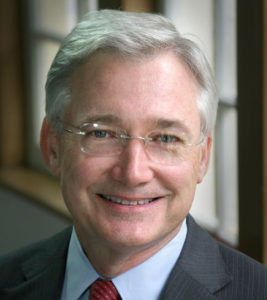Things already out of balance have gotten worse this past year. I’m talking about the balance between the realm of the personal, the realm of the public and the realm of the communal. The realm of the communal, of course, has suffered the most and is vital to the health of all three realms and of our lives.
The personal realm has to do with the self, a preoccupation in our day. Self-realization is the new salvation. We live in a culture of extreme individualism where individual “rights” are supreme and where we believe a person can thrive apart from the public and communal realms. Luther spoke about the “self curved in on itself.” It is still a spiritual malady.

Stephen Shoemaker
The realm of the public has to do with the “body politic,” with the welfare of the whole, with the common good. Our social media accentuates this realm to an almost oppressive degree. Everything is political. Public policy is the supreme moral realm. The 24/7 cable news is everywhere. Our minds are saturated with the res publica, the things pertaining to the public realm. Our sense of well-being is too bound up with public and political things.
What is increasingly missing is the communal realm, life in community — and not just because of the pandemic shutdowns. It is an American malaise. Neighborliness is a lost art. Wendell Berry has written much about “The Membership” where we are, as he uses the Pauline phrase, “members of one another.” One character in his fiction, Burley Coulter, says, “The way we are, we are members of each other. All of us. Everything. The difference ain’t in who is a member and who is not, but in who knows and who don’t.”
The realm of the communal, of the Neighborhood and the Membership, is an essential dimension of our well-being and thriving — and of our moral responsibility. It is the connective tissue between the personal and public realms. When we disregard it, it is like saying, “I love my teeth, but I don’t care for my gums.” We live in splendid isolation or as those captured in the public realm.
God knew we needed community when God brought Israel into being as a people and gave birth to the church. It is where we learn how to live in community. There is a learning curve, in case you haven’t noticed. Such is why Paul gave so much attention to living together in the body of Christ. As we return to church and community, it may take a little time to get used to each other again and to live in true community. Come Holy Spirit, come!
“As we return to church and community, it may take a little time to get used to each other again and to live in true community.”
Individualism has infected the church as we live in our American culture of hyper-individualism, and the well-being of the body of Christ has suffered.
The hymn writer Brian Wren spoke of the difference between a “broken body” and a “divided body.” A broken body is a human body with its inevitable hurts and pains. The body of Christ is a broken body. In such a body every member of the body feels the pain of the other part of the body, as a toothache can make the whole body miserable.
A broken body becomes a “divided body” when one part of the body cannot feel the pain of the other part. The foot cares little about the hurt of the elbow. The ear cannot feel the pain of the knee. That is when the body begins to self-destruct. The young members can’t feel the pain of the older members, the long-term members the pain of the newcomers, the healthy the pain of those who are ill. Paul wrote of the wealthier members disregarding the needs of the poorer members of the body in Corinth.
Of course, when we don’t feel the pain of the other parts, we can’t feel the pleasure of the other parts either, and the bonds of affection wither. What loss. May the God who put us in community renew our re-gathering communities so we may find unity in reconciled diversity and recover the balance of our lives. Blessed neighboring.
Stephen Shoemaker serves as pastor of Grace Baptist Church in Statesville, N.C. He served previously as pastor of Myers Park Baptist in Charlotte, N.C.; Broadway Baptist in Fort Worth, Texas, and Crescent Hill Baptist in Louisville, Ky.


